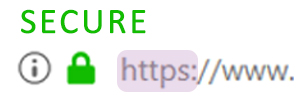
Since the dawn of the internet, most website addresses have been accessed using what is know as Hypertext Transfer Protocol, or HTTP. I am sure you have seen the “http://” at the beginning of a URL, and when a website is accessed using HTTP, the data is being transmitted in an unsecured manner.
In order to access website pages in an encrypted and secure manner, Hypertext Transfer Protocol Secure (HTTPS) is used instead. This is accomplished by installing an SSL (Secure Socket Layer) Certificate on your website. Pages accessed via HTTPS will show “https://” at the start of the url and a little lock icon in the address bar of the browser. This means that transmitting information to and from the website is now encrypted and secure. Additionally the SSL certificate identifies and authenticates the website.
In the past, most websites only used encryption on pages or areas or the site that required a user to submit sensitive information, such as login username and passwords, personal information, or credit card information.
But a few years ago, Google started an initiative of “HTTPS Everywhere,” meaning that your entire website, by default, needs to be accessed in an encrypted manner. Why is this important? Because Google is actually penalizing websites without encryption, and actually giving a higher ranking preference in their search engine to those websites that do have encryption. This meant that not having HTTPS access on your website by default will hurt your traffic. Also, web browsers are now showing a “not secure” warning when your website is visited…which does not look good for your users.
Installing and SSL certificate and configuring your entire website to come up as encrypted by default, will allow you to improve your website’s Google ranking, ultimately creating additional traffic to your website. Additionally, you are now providing data to your users in an encrypted manner, making it more private as the information is transferred over the internet, increasing the level of trust with your users.
If you found this post informative and would like to obtain more information or discuss At Point® web development services, please visit our contact us page.
